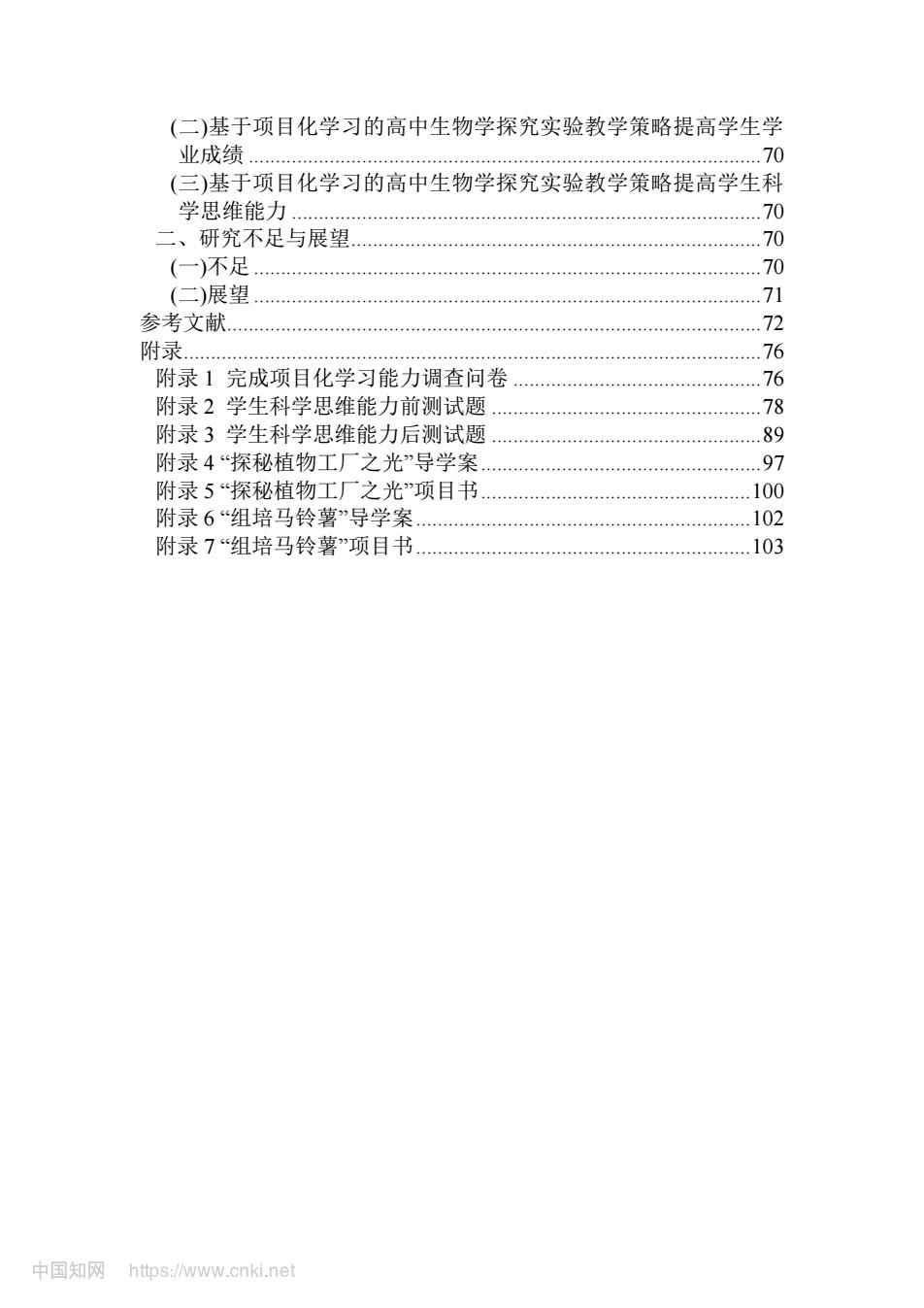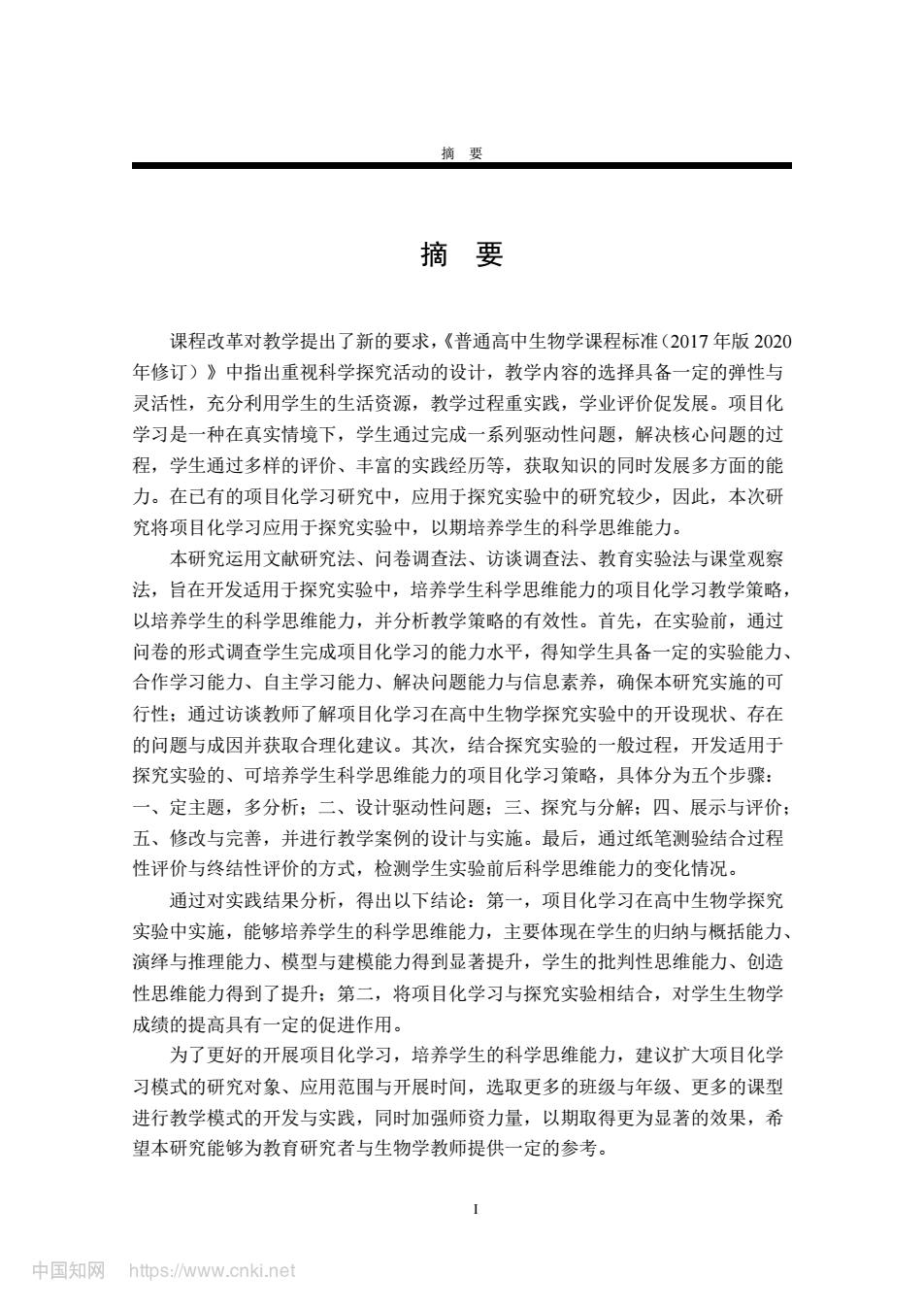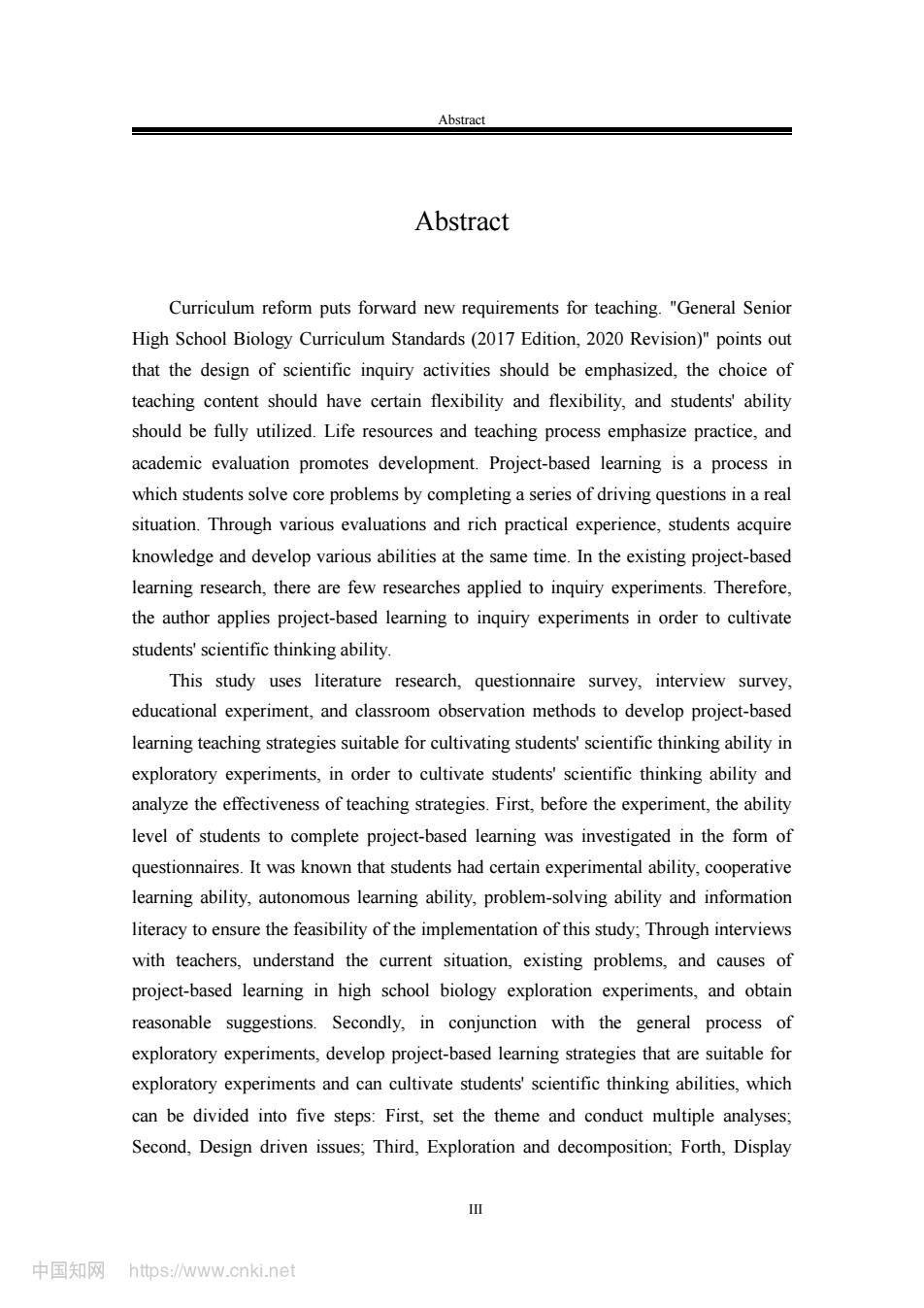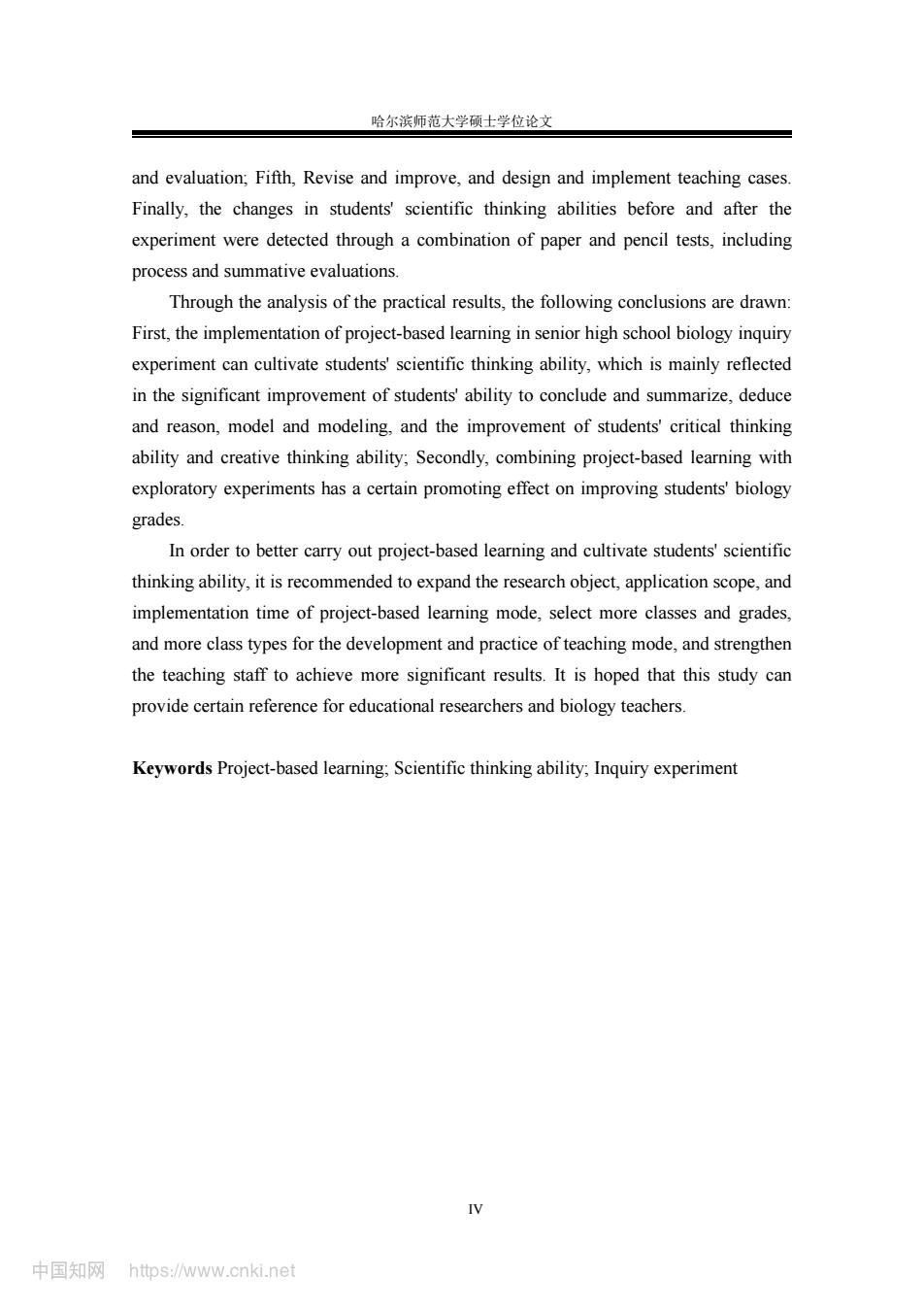
(二)基于项目化学习的高中生物学探究实验教学策略提高学生学 业成绩. .70 (三)基于项目化学习的高中生物学探究实验教学策略提高学生科 学思维能力 .70 二、研究不足与展望 .70 (一)不足 70 (二)展望 .71 参考文献. 72 附录 .76 附录1完成项目化学习能力调查问卷 76 附录2学生科学思维能力前测试题 .78 附录3学生科学思维能力后测试题 .89 附录4“探秘植物工厂之光”导学案 97 附录5“探秘植物工厂之光”项目书 .100 附录6“组培马铃薯”导学案。 .102 附录7“组培马铃薯”项目书 .103 中国知网https://www.cnki.ne
(二)基于项目化学习的高中生物学探究实验教学策略提高学生学 业成绩 .70 (三)基于项目化学习的高中生物学探究实验教学策略提高学生科 学思维能力 .70 二、研究不足与展望.70 (一)不足.70 (二)展望.71 参考文献.72 附录.76 附录 1 完成项目化学习能力调查问卷 .76 附录 2 学生科学思维能力前测试题 .78 附录 3 学生科学思维能力后测试题 .89 附录 4 “探秘植物工厂之光”导学案.97 附录 5 “探秘植物工厂之光”项目书.100 附录 6 “组培马铃薯”导学案.102 附录 7 “组培马铃薯”项目书.103

摘要 摘要 课程改革对教学提出了新的要求,《普通高中生物学课程标准(2017年版2020 年修订)》中指出重视科学探究活动的设计,教学内容的选择具备一定的弹性与 灵活性,充分利用学生的生活资源,教学过程重实践,学业评价促发展。项目化 学习是一种在真实情境下,学生通过完成一系列驱动性问题,解决核心问题的过 程,学生通过多样的评价、丰富的实践经历等,获取知识的同时发展多方面的能 力。在已有的项目化学习研究中,应用于探究实验中的研究较少,因此,本次研 究将项目化学习应用于探究实验中,以期培养学生的科学思维能力。 本研究运用文献研究法、问卷调查法、访谈调查法、教育实验法与课堂观察 法,旨在开发适用于探究实验中,培养学生科学思维能力的项目化学习教学策略 以培养学生的科学思维能力,并分析教学策略的有效性。首先,在实验前,通过 问卷的形式调查学生完成项目化学习的能力水平,得知学生具备一定的实验能力、 合作学习能力、自主学习能力、解决问题能力与信息素养,确保本研究实施的可 行性:通过访谈教师了解项目化学习在高中生物学探究实验中的开设现状、存在 的问题与成因并获取合理化建议。其次,结合探究实验的一般过程,开发适用于 探究实验的、可培养学生科学思维能力的项目化学习策略,具体分为五个步骤: 一、定主题,多分析:二、设计驱动性问题:三、探究与分解:四、展示与评价: 五、修改与完善,并进行教学案例的设计与实施。最后,通过纸笔测验结合过程 性评价与终结性评价的方式,检测学生实验前后科学思维能力的变化情况。 通过对实践结果分析,得出以下结论:第一,项目化学习在高中生物学探究 实验中实施,能够培养学生的科学思维能力,主要体现在学生的归纳与概括能力、 演绎与推理能力、模型与建模能力得到显著提升,学生的批判性思维能力、创造 性思维能力得到了提升:第二,将项目化学习与探究实验相结合,对学生生物学 成绩的提高具有一定的促进作用。 为了更好的开展项目化学习,培养学生的科学思维能力,建议扩大项目化学 习模式的研究对象、应用范围与开展时间,选取更多的班级与年级、更多的课型 进行教学模式的开发与实践,同时加强师资力量,以期取得更为显著的效果,希 望本研究能够为教育研究者与生物学教师提供一定的参考。 1 中国知网https://www.cnki.ne
摘 要 I 摘 要 课程改革对教学提出了新的要求,《普通高中生物学课程标准(2017 年版 2020 年修订)》中指出重视科学探究活动的设计,教学内容的选择具备一定的弹性与 灵活性,充分利用学生的生活资源,教学过程重实践,学业评价促发展。项目化 学习是一种在真实情境下,学生通过完成一系列驱动性问题,解决核心问题的过 程,学生通过多样的评价、丰富的实践经历等,获取知识的同时发展多方面的能 力。在已有的项目化学习研究中,应用于探究实验中的研究较少,因此,本次研 究将项目化学习应用于探究实验中,以期培养学生的科学思维能力。 本研究运用文献研究法、问卷调查法、访谈调查法、教育实验法与课堂观察 法,旨在开发适用于探究实验中,培养学生科学思维能力的项目化学习教学策略, 以培养学生的科学思维能力,并分析教学策略的有效性。首先,在实验前,通过 问卷的形式调查学生完成项目化学习的能力水平,得知学生具备一定的实验能力、 合作学习能力、自主学习能力、解决问题能力与信息素养,确保本研究实施的可 行性;通过访谈教师了解项目化学习在高中生物学探究实验中的开设现状、存在 的问题与成因并获取合理化建议。其次,结合探究实验的一般过程,开发适用于 探究实验的、可培养学生科学思维能力的项目化学习策略,具体分为五个步骤: 一、定主题,多分析;二、设计驱动性问题;三、探究与分解;四、展示与评价; 五、修改与完善,并进行教学案例的设计与实施。最后,通过纸笔测验结合过程 性评价与终结性评价的方式,检测学生实验前后科学思维能力的变化情况。 通过对实践结果分析,得出以下结论:第一,项目化学习在高中生物学探究 实验中实施,能够培养学生的科学思维能力,主要体现在学生的归纳与概括能力、 演绎与推理能力、模型与建模能力得到显著提升,学生的批判性思维能力、创造 性思维能力得到了提升;第二,将项目化学习与探究实验相结合,对学生生物学 成绩的提高具有一定的促进作用。 为了更好的开展项目化学习,培养学生的科学思维能力,建议扩大项目化学 习模式的研究对象、应用范围与开展时间,选取更多的班级与年级、更多的课型 进行教学模式的开发与实践,同时加强师资力量,以期取得更为显著的效果,希 望本研究能够为教育研究者与生物学教师提供一定的参考

哈尔滨师范大学硕士学位论文 关键词项目化学习;科学思维能力:探究实验 中国知网https://www.cnki.net
哈尔滨师范大学硕士学位论文 II 关键词 项目化学习;科学思维能力;探究实验

Abstract Abstract Curriculum reform puts forward new requirements for teaching."General Senior High School Biology Curriculum Standards(2017 Edition,2020 Revision)"points out that the design of scientific inquiry activities should be emphasized,the choice of teaching content should have certain flexibility and flexibility,and students'ability should be fully utilized.Life resources and teaching process emphasize practice,and academic evaluation promotes development.Project-based learning is a process in which students solve core problems by completing a series of driving questions in a real situation.Through various evaluations and rich practical experience,students acquire knowledge and develop various abilities at the same time.In the existing project-based learning research,there are few researches applied to inquiry experiments.Therefore, the author applies project-based learning to inquiry experiments in order to cultivate students'scientific thinking ability This study uses literature research,questionnaire survey,interview survey. educational experiment,and classroom observation methods to develop project-based learning teaching strategies suitable for cultivating students'scientific thinking ability in exploratory experiments,in order to cultivate students'scientific thinking ability and analyze the effectiveness of teaching strategies.First.before the experiment,the ability level of students to complete project-based leamning was investigated in the form of questionnaires.It was known that students had certain experimental ability,cooperative learning ability,autonomous learning ability,problem-solving ability and information literacy to ensure the feasibility of the implementation of this study:Through interviews with teachers,understand the current situation,existing problems,and causes of project-based learning in high school biology exploration experiments,and obtain reasonable suggestions.Secondly.in conjunction with the general process of exploratory experiments,develop project-based learning strategies that are suitable for exploratory experiments and can cultivate students'scientific thinking abilities,which can be divided into five steps:First,set the theme and conduct multiple analyses; Second,Design driven issues,Third,Exploration and decomposition,Forth,Display 中国知网https://www.cnki.ne
Abstract III Abstract Curriculum reform puts forward new requirements for teaching. "General Senior High School Biology Curriculum Standards (2017 Edition, 2020 Revision)" points out that the design of scientific inquiry activities should be emphasized, the choice of teaching content should have certain flexibility and flexibility, and students' ability should be fully utilized. Life resources and teaching process emphasize practice, and academic evaluation promotes development. Project-based learning is a process in which students solve core problems by completing a series of driving questions in a real situation. Through various evaluations and rich practical experience, students acquire knowledge and develop various abilities at the same time. In the existing project-based learning research, there are few researches applied to inquiry experiments. Therefore, the author applies project-based learning to inquiry experiments in order to cultivate students' scientific thinking ability. This study uses literature research, questionnaire survey, interview survey, educational experiment, and classroom observation methods to develop project-based learning teaching strategies suitable for cultivating students' scientific thinking ability in exploratory experiments, in order to cultivate students' scientific thinking ability and analyze the effectiveness of teaching strategies. First, before the experiment, the ability level of students to complete project-based learning was investigated in the form of questionnaires. It was known that students had certain experimental ability, cooperative learning ability, autonomous learning ability, problem-solving ability and information literacy to ensure the feasibility of the implementation of this study; Through interviews with teachers, understand the current situation, existing problems, and causes of project-based learning in high school biology exploration experiments, and obtain reasonable suggestions. Secondly, in conjunction with the general process of exploratory experiments, develop project-based learning strategies that are suitable for exploratory experiments and can cultivate students' scientific thinking abilities, which can be divided into five steps: First, set the theme and conduct multiple analyses; Second, Design driven issues; Third, Exploration and decomposition; Forth, Display

哈尔滨师范大学硕士学位论文 and evaluation;Fifth,Revise and improve,and design and implement teaching cases. Finally,the changes in students'scientific thinking abilities before and after the experiment were detected through a combination of paper and pencil tests,including process and summative evaluations. Through the analysis of the practical results,the following conclusions are drawn: First,the implementation of project-based learning in senior high school biology inquiry experiment can cultivate students'scientific thinking ability,which is mainly reflected in the significant improvement of students'ability to conclude and summarize,deduce and reason,model and modeling,and the improvement of students'critical thinking ability and creative thinking ability,Secondly,combining project-based learning with exploratory experiments has a certain promoting effect on improving students'biology grades. In order to better carry out project-based learning and cultivate students'scientific thinking ability.it is recommended to expand the research object.application scope.and implementation time of project-based learning mode,select more classes and grades. and more class types for the development and practice of teaching mode,and strengthen the teaching staff to achieve more significant results.It is hoped that this study can provide certain reference for educational researchers and biology teachers Keywords Project-based learning:Scientific thinking ability:Inquiry experiment 中国知网https://www.cnki.ne
哈尔滨师范大学硕士学位论文 IV and evaluation; Fifth, Revise and improve, and design and implement teaching cases. Finally, the changes in students' scientific thinking abilities before and after the experiment were detected through a combination of paper and pencil tests, including process and summative evaluations. Through the analysis of the practical results, the following conclusions are drawn: First, the implementation of project-based learning in senior high school biology inquiry experiment can cultivate students' scientific thinking ability, which is mainly reflected in the significant improvement of students' ability to conclude and summarize, deduce and reason, model and modeling, and the improvement of students' critical thinking ability and creative thinking ability; Secondly, combining project-based learning with exploratory experiments has a certain promoting effect on improving students' biology grades. In order to better carry out project-based learning and cultivate students' scientific thinking ability, it is recommended to expand the research object, application scope, and implementation time of project-based learning mode, select more classes and grades, and more class types for the development and practice of teaching mode, and strengthen the teaching staff to achieve more significant results. It is hoped that this study can provide certain reference for educational researchers and biology teachers. Keywords Project-based learning; Scientific thinking ability; Inquiry experiment